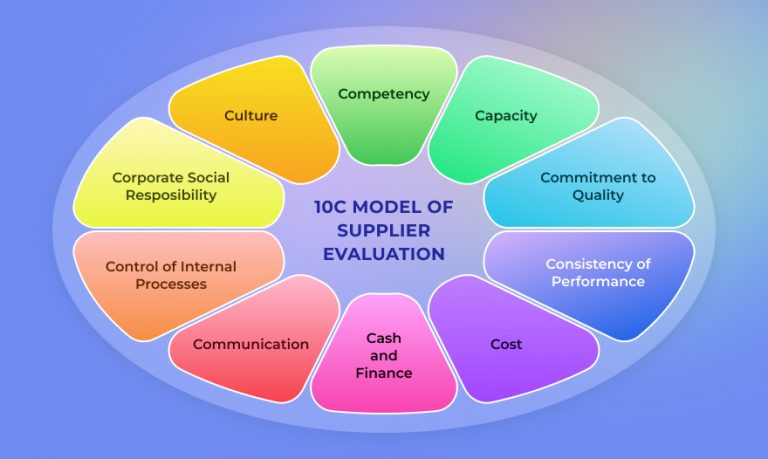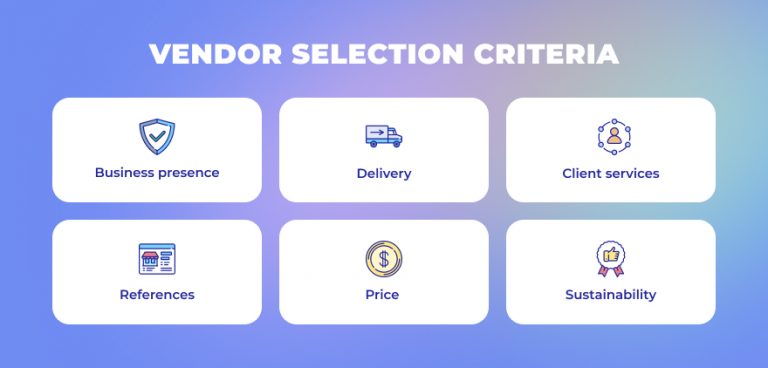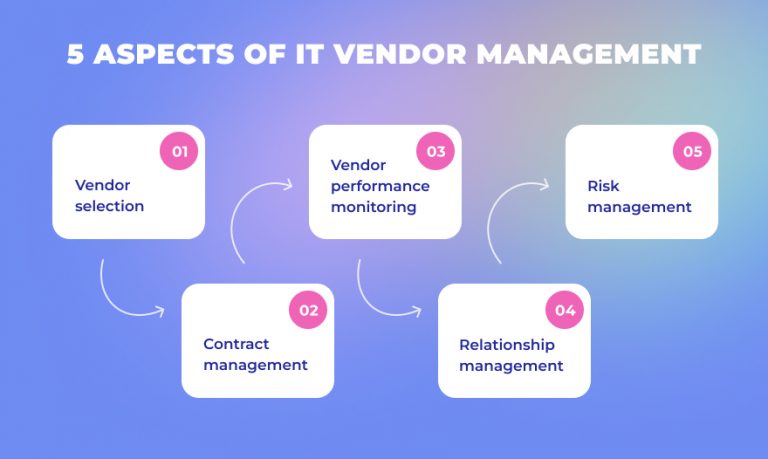Sooner or later, every business needs to partner up with vendors to fulfil some of its needs. The IT vendor selection process is not easy, requiring a lot of team attention, evaluation, and analysis.
However, it is common practice to simplify this process as much as possible and consider only one vendor selection criterion—the price. But low prices alone won’t make your cooperation pleasant or successful. Other factors that characterise your partnership play no less important a role, and neglecting them will only create additional issues.
As a result, you won’t be satisfied with the quality of your cooperation and decide to change vendors. Until you understand how the correct software vendor selection process works and adopt it, you will face the same issues, stay discontented, and waste lots of money and time jumping from vendor to vendor.
In this article, we will describe an efficient supplier selection process, the essential vendor selection criteria, and how to partner with vendors wisely.

How to select a successful vendor: main steps overview
So, you decided to cooperate with a new vendor. The easiest solution will be to Google and scroll through the first few pages to find a company that provides your desired services. However, choosing the first vendor you see wouldn’t go well for certain.
The next vendor selection phases will help you go through this process wisely and with maximum value for your business.
What are the business requirements to find the right vendor?
To find your ideal vendor, first, you need to understand what your needs are and what aspects you need to be covered by the partner. The best way to achieve that is to assemble a team of employees who are directly interested in selecting suppliers and let them define the business requirements your potential vendor should meet.
As a result, you should have in writing the following:
What product or service are you expecting from a vendor?
What are the business and technical (if needed) requirements for the aforementioned product or service?
What requirements should not only the product, but also the vendor company, meet?
Research potential vendors

When you have a clear vision of your needs and requirements, you can start your research and look for companies that can meet your expectations and provide a decent level of service.
We suggest taking your time and thoroughly checking vendors’ backgrounds, brands, and reputations as service providers and employers. Try to look for testimonials and reviews from former and current clients and employees, as well as check their social media and profiles on different listing websites and directories.
An occasional bad review might not be a problem, but regular complaints or inadequate replies from the vendor company should definitely be a red flag for you.
Request for Proposal (RFP)
A request for proposal (RFP) is a document companies send to potential vendors to initiate negotiations. It helps businesses describe their requirements for potential vendors clearly and later compare their proposals based on objective criteria.
A good request for proposal (RFP) should include:
Introduction and executive summary
An overview of your business and its background
A proposal instruction for the vendor (what structure should it have, when should it be submitted, what are the contact details they should use to send it, etc)
The list of requirements the vendor should meet
Terms and conditions of the cooperation you seek.
Proposal evaluation process

When you have received several offers, you need to evaluate each one and compare them. The best way to do this is to use a vendor comparison matrix that considers only objective criteria and minimises human emotion.
Assign every criterion to a certain point and its weighting. Check every vendor proposal (luckily, if you had done it right, you received proposals written by the same template), score the potential suppliers by selection criteria, and do the math.
As a result, your team will have numbers when evaluating vendors, which will power decision-making instead of emotions or political schemes.
Vendor selection
After the proposal evaluation, you will most likely have several possible vendors who received a great score and can cover your needs. Then, you might want to choose one who made a better impression on you or is ready to provide a bonus or discount for you.
When you are done with the vendor selection phase, you go to contract negotiation. Work carefully on contract terms, understand what the bottom line for you is, and where you can compromise. Hence, don’t push only for your best interest, and don’t demand the impossible to enable seamless vendor relationships.
Remember to write down possible liabilities and risks, and how you will address complex situations and force majeure that might occur during the contract period.
Supplier selection criteria overview

So, what criteria should you take into consideration while choosing a vendor? You need to learn a set of important aspects about potential suppliers before signing a contract. Otherwise, you might be unpleasantly surprised by their performance, policies, or lack of integrity. To ensure a successful vendor selection process, we suggest gathering and evaluating as much info about the vendor before signing any contract or initiating a partnership.
So, evaluate a potential supplier by the following parameters
Business presence
How long has the business been operating on the market? The maturity of the company implies that it has already generated experience in the chosen niche, established its inner processes, and is able to avoid issues in the partnership that young companies might not know how to handle efficiently.
Delivery
A good supplier should be able to fulfill your request regularly (for example, if we are talking about the supply chain), or they should provide you with a complete solution you are looking for (if we are talking about an IT vendor). The ability to deliver their products or services without disruptions and at full capacity is a must for successful cooperation.
Client services
Even the supplier with the best services might not be a good choice if it has poor customer support. Cooperation with any supplier implies that you will stay in close contact with them. Hence, you need your partners to be polite, share similar values, and stay ethical. Otherwise, an unreliable, irresponsible, or rude manager can destroy any good relationships you might have.
References
References are your opportunity to check a supplier’s performance in the past and ensure that they won’t provide you with poor service. However, always evaluate responses and testimonials from previous customers: it might happen that their opinion isn’t totally objective.
Price
We have mentioned that cost shouldn’t be a decisive factor in the supplier selection process. However, it is impossible to remove it from the supplier selection criteria: every company has a price threshold. Hence, your main objective here is to balance cost and benefits and choose an offer that will give you the maximum value for its price.
Don’t chase propositions with budgets lower than average on the market: more likely, such cheapness can be only achieved by sacrificing quality. Explore our new cost estimation calculator designed to empower our clients with quick and accurate assessments of software development project costs.
Sustainability
Won’t a supplier company go out of business in a few months, forcing you to search for a new vendor? To protect your business from losses, try to evaluate vendor sustainability beforehand and check if they have any financial liabilities they can’t cover or have incurred in the past.
Mistakes in choosing vendors overview
While evaluating suitable vendors, you might make some mistakes that can bring down the whole experience. However, knowing about the main threats might help avoid them and prepare mitigation plans.
So, what are the main errors you might make while searching for the right supplier?
Not aligning processes
Though your partnership with a supplier should be cooperative, you still need to prioritise your processes over vendors. If you need to adjust much for the supplier to work efficiently, most likely, you have chosen not the best option on the market and need to spend more money.
Hence, it would be wise to determine whether the chosen vendor is flexible enough to efficiently meet your needs.
Rushing through the supplier selection process
Sometimes, we tend to rush the entire process and finish a task as soon as possible. Sometimes, we have a deadline that significantly cuts our opportunity to think over our choice. However, it might only harm your supplier selection.
To go efficiently through the vendor selection process, you need time to prepare all necessary documentation, navigate your options, carefully estimate every offer, agree on the selection with superiors and all parties interested, etc.
If you decide to sacrifice any of these steps to speed up the process, you will definitely feel the consequences later, and they won’t be positive.
Not considering the future
In your vendor selection process, you need to consider not only your current business objectives but also your potential needs and requirements in the future. Why? Every company plans to expand; otherwise, it will eventually shut down. Your volumes, expectations, and requests will increase accordingly.
Hence, when you sign a contract with a vendor, you need to ensure that they have the capacity to grow your cooperation volumes to match the growth of your company. If you miss this at the initial stages, you will need to launch the vendor termination process and, hence, lose the time and money you would be able to dedicate to other activities.
Dismissing documentation
We have discussed some documents you need to create for your supplier selection process. We suggest that you go even further and document every decision and its reasoning.
Storing this data is essential for knowledge transfer and process continuity. It will also help you onboard new employees who will manage your procurement process and simplify future supplier selection activities.
Not having stakeholders on the same page
Supplier selection is an important decision for a company. This process concerns not only the procurement but also C-level management and possibly other departments. Hence, your supplier selection should not happen in a vacuum, and the future partnership should not be a surprise for your colleagues and superiors.
To avoid any misunderstandings or miscommunications, synchronise with all stakeholders during the selection process. You can include them in the team that will work on gathering requirements or reviewing proposals. It will also simplify the process of approving the selection: instead of simply asking for approval, you integrate key people into the decision-making process.
IT industry: selection criteria for vendors
Choosing an IT partner isn’t just about finding technical expertise—it’s about aligning with a vendor that can support your business’s long-term strategy. Especially in today’s rapidly evolving tech landscape, your IT vendor must meet high standards not just in delivery, but in architecture, security, and scalability.
Key modern criteria to evaluate include:
Cloud maturity: Is the vendor experienced in managing cloud-native systems (e.g., Kubernetes, CI/CD, infrastructure as code)?
Security posture: Do they follow security-by-design practices and hold certifications like ISO 27001, SOC 2, or GDPR compliance?
Tech stack alignment: Are they experts in the platforms and tools you use or plan to adopt?
Scalability readiness: Can they adapt to spikes in demand or evolving product scope?
Governance and DevOps: Is their delivery process transparent and efficient?
For example, Slack was initially a game company. They pivoted after selecting a small vendor that eventually helped them scale their messaging architecture. That partner had the DevOps experience that Slack lacked.
IT vendor selection is only the first step. Even if you choose the right vendor, without adequate vendor management, you will have a high chance of failure.

But it should not be only your effort: IT vendors should also be interested in providing the best services possible. For example, we at Altamira focus not just on writing code but on providing a solution tailored to your business needs and goals.
Cooperating with Altamira, you benefit from:
a team of experts who know how to help you determine requirements and deliver a solution, especially for your business;
client success and project managers who stay in touch with a client constantly and whose priority is to ensure a superior client experience;
high level of ownership over the project, meaning that we are ready to take responsibility for project success and viability;
personal approach to every client and every project;
flexible cooperation and payment terms.

In conclusion
Choosing the right vendor requires a lot of focus and dedication from a procurement team. However, a thorough approach will yield results and introduce you to a reliable partner who can strengthen your business instead of generating additional issues.
FAQ
The most important factor in vendor selection is aligning the vendor’s capabilities and values with your business goals. This ensures that the vendor can meet your specific needs and support your long-term strategy.
The five key criteria to consider when selecting a supplier are:
- Quality of products or services
- Reliability and delivery times
- Cost and overall value
- Customer service and communication
- Flexibility and adaptability to your needs
Contact us to get a free expert consultation.
An RFP (Request for Proposal) is a document that outlines your project requirements and invites vendors to submit bids. It’s an important step in the vendor selection process, as it helps you gather detailed proposals and compare potential suppliers based on your specific needs.
The three stages of vendor selection are:
- Pre-qualification: Identifying and shortlisting potential vendors.
- Evaluation: Assessing vendors based on criteria such as cost, quality, and reliability.
- Selection and contracting: Finalising the choice and establishing contractual terms.
Get in touch to learn more.
Vendor strategy is the plan and approach a company uses to manage and optimise its relationships with suppliers. This includes selecting the right vendors, maintaining strong partnerships, and continuously evaluating performance to ensure they align with business goals.
Vendor evaluation involves assessing potential suppliers based on factors such as their financial stability, experience, product or service quality, reliability, and ability to meet deadlines. Tools like scorecards, performance metrics, and site visits can aid in this assessment.






